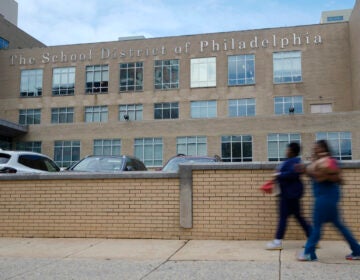Changes at Pennsylvania School for the Deaf have some parents, advocates up in arms
Changes at the Pennsylvania School for the Deaf in Northwest Philadelphia are rankling many in the community.
Pat Pomroy, custodial grandparent of two students at the school, said she’s concerned the school’s leadership is forcing out qualified staff.
“My granddaughter had a speech therapist,” said Pomroy. “She was very very good, but she was also very vocal. The next thing I know, [the therapist] was gone.”
Seven positions eliminated
A number of parents and teachers echoed Pomroy’s concerns about a lack of deaf leadership on the school’s board of trustees, an announced budget deficit and staffing changes.
By the end of June, seven full-time and two part-time positions will be eliminated through layoffs and attrition. These include a counselor, two part-time movement therapists, the library manager, an administrator, a reading specialist, an occupational therapist, the athletic coordinator and an art teacher. In total, these positions represent about 5 percent of the school’s total staff.
Margie Marshall, whose 11-year-old daughter is hard of hearing and requires additional emotional supports, said the quality of education for her daughter has declined.
“I’ve been there long enough to know that there’s a huge difference,” she said. Marshall said administrators recently recommended her daughter’s individualized education plan, the legal document that spells out care for special education students, be changed to de-emphasize her deafness.
Marshall said if she hadn’t known enough to push back, “the change in that placement would probably set [my daughter] back years.”
Deaf students and those with multiple disabilities face unique learning challenges. Unless their parents are fluent in sign language, school is the only place for many to access, learn and practice communication.
Teachers shared stories of new hires not having full proficiency in American Sign Language, with more experienced staff leaving.
But the school’s policy is that new staff have five years to become fluent in the language, said Marja Brandon, the head of school.
She also said sign language is the language of instruction. “Everything’s in sign language here,” she said. “We’re a sign language school.”
This is not the first time PSD’s school community has raised concerns about decision making at the school. Worries about curriculum and staffing changes were at the heart of a push to start a teachers union earlier this year.
Another concern from staff and advocacy groups for the deaf has to do with representation in the school’s leadership. On the board of trustees, “every single person whose vote matters is hearing,” Marshall said.
That lack of representation has now caught the attention of local and national deaf rights organizations.
The Pennsylvania Society for the Advancement of the Deaf released a position paper earlier this month. The group is monitoring eight main issues, including administrative staff hires who do not have a background in deaf education and a reduction in counseling and therapist positions.
Representatives from the National Association for the Deaf also attended last week’s board meeting.
Asked about the lack of deaf people leading the school’s board, Brandon said, “I think in my time here, what I’ve tried to do is improve that.” Brandon is a hearing person, but her husband is deaf. He is also an independent curriculum consultant for the school.
Funding changes
Brandon, who has faced scrutiny from parents and teachers, said changes to fixed costs and volatility in the state’s funding are the reasons for recent school cutbacks.
“We have been flat-funded [by Pennsylvania] for five years,” she said. “I made really hard decisions.”
Other funding changes compounded the static revenue, according to Brandon.
Changes to ACCESS funding — state money that helps pays for Medicaid reimbursable services such as occupational therapy — mean that money now goes to school districts instead of directly to state-chartered special education institutions such as the School for the Deaf.
The school also participates in the state’s pension system, which has increased employer contributions for the past three years.
Combined, this leaves the school with a budge deficit of more than $800,000, according to Brandon. Gov. Tom Wolf’s proposed budget could relieve some of that burden, said Brandon, but the current uncertainty in the state’s contribution is “scary.”
To cut costs, Brandon said the administration rearranged teaching schedules to maximize efficiency. She also said she’s working with the school districts that now receive ACCESS funds to try to keep some support staff, like the occupational therapist.
The school’s newly formed union has filed unfair labor complaints with the National Labor Relations Board in response to the layoffs. Representatives for the union say the school has hired Burdzinski & Partners, Inc., an organization of “labor relations specialists, non-lawyers, agents and advocates for employers” from Ohio, to represent its interests at the negotiating table.
WHYY is your source for fact-based, in-depth journalism and information. As a nonprofit organization, we rely on financial support from readers like you. Please give today.




